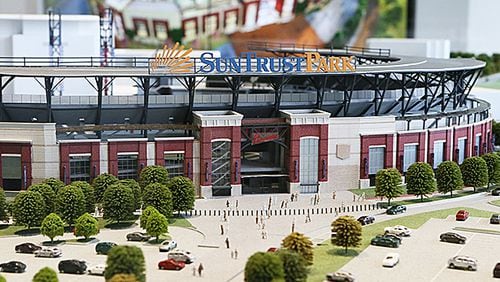It’s legal for Cobb County to take on about $397 million in debt for the new Atlanta Braves stadium, the Georgia Supreme Court said Monday in a ruling that found the public financing of SunTrust Park constitutional.
The ruling paves the way for Cobb to issue bonds for the $672 million stadium, which already is under construction and is scheduled to open in 2017. County taxpayers will provide $368 million for the project; the rest of the money will cover financing costs and about a year of initial interest on the debt.
The high court’s decision was unanimous, but not without reservation.
“While aspects of the deal structure at issue may push the law about as far as it can go, it does not cross the line into illegality,” the 43-page opinion says. “In so holding, we do not discount the concerns … raised about the wisdom of the stadium project and the commitments Cobb County has made to entice the Braves to move there.
“But those concerns lie predominantly in the realm of public policy entrusted to the county’s elected officials for decision, not in the realm of constitutional or statutory law.”
The Supreme Court justices heard oral arguments in the case in February, about six months after a Cobb Superior Court judge certified the validity of the bonds.
Three Cobb residents — attorney Tucker Hobgood, Larry Savage and Rich Pellegrino — appealed that validation in three separate cases.
Those appeals revolved around a few main arguments, one of them being that the public debt needed to be approved by voters. Government attorneys argued that a referendum was not required because of the contractual agreement between the county and the Cobb-Marietta Coliseum and Exhibit Hall Authority, which will issue the taxpayer-backed bonds.
The high court said it has ruled consistently on that issue — called the constitutional debt clause — for decades, and at least twice after changes to the state constitution.
“Because no intergovernmental contract would be valid without the approval of a majority of voters in the political subdivision, overruling our precedents would cast into doubt countless existing contracts entered without a referendum, as well as plans for future contracts for a wide variety of facilities and services ranging from hospitals, roads, and recreation facilities to police, fire, animal control and other public safety services,” the opinion says.
Hobgood called the ruling “a resounding victory for those who advocate that big government, in league with big business, can and should saddle taxpayers with long-term debt without taxpayer consent by a specific vote.”
Savage said that he knew it was a “big risk in trying to overturn a precedent that has been in place for 63 years.”
“I felt that making it right and restoring our voting right to control local government was worth going for it,” Savage said. “But precedent prevails. And, despite the clear words of the Constitution, we don’t get a vote.”
There were other arguments against validation of the bonds — that the contract between Cobb and the authority is not valid; that a professional baseball stadium is outside the realm of allowable projects for a local government; and that issuance of the bonds violates the states gratuities clause, which says government funds cannot be given to a private business.
“These arguments fail,” the ruling says.
The Braves issued a statement saying they were “confident that the process undertaken by our partners in Cobb County to issue the bonds was thorough and legally sound.”
“We have been working diligently for months to prepare SunTrust Park for Opening Day of 2017,” the statement says. “We are pleased that the Georgia Supreme Court has validated the bonds and we look forward to delivering SunTrust Park and the surrounding mixed-use community to our fans, the people of Cobb County and the metro Atlanta region.”
Also in a prepared statement, Cobb Commission Chairman Tim Lee said the project has already paid off with “thousands” of construction jobs.
“I’m pleased that the Supreme Court of Georgia unanimously upheld Cobb County’s position and that we can continue to move forward with this catalyst development that will secure Cobb County as the home of the Atlanta Braves for 30 years to come,” Lee’s statement says. The county hopes to issue the bonds in the next 60 days.
The justices said that Lee, and his peers on the commission, might have the most to lose with the project.
“If the stadium deal does not fulfill the high expectations that have been set for it, there may be a significant political price to pay for those who negotiated and signed onto it,” the ruling says.
Hobgood said that he respects the ruling, but said it is so broad that there is nothing to stop government from giving money to any private entity for any enterprise.
“Regardless of whether the electorate vote out the current Board of Commissioners, my grandchildren, and the Cobb Board of Commissioners in 2045, will be paying for this … with no one having to ask the taxpayers for permission,” Hobgood said. “The constitutional debt clause appears to be a dead letter.”








